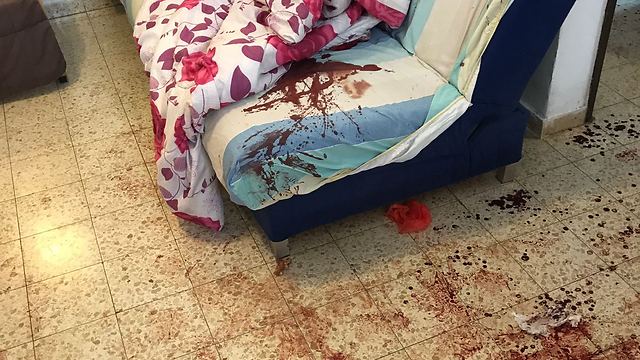

IDF pinpoints failures in preventing Halamish stabbing
After terrorist stabbed to death 3 and wounded a fourth in Halamish massacre, IDF probe identifies failures; takes disciplinary action against guard who failed to report leaving settlement before attack; 15 minutes between alert triggered by electric fence and terrorist being neutralized.
The fault were found both among IDF forces stationed in the area and the civilian security body in Halamish, allowing the terrorist to infiltrate the settlement, despite an alert set off when he climbed over the community's outside security fence.
Disciplinary action has been taken against those who bear responsibility for the faults, most of them relatively junior commands.
A company commander from the Kfir Brigade's Netzah Yehuda battalion, who was responsible for the protection of the settlement and whose company was stationed in an outpost adjacent to Halamish, was reprimanded by the Kfir Brigade commander for failing to comply with operational procedures.
The territorial defense officer in the Binyamin Territorial Brigade (a major), who is in charge of the coordination between civilian and military forces, had an infraction noted in his personal file.
The area patrol commander, who was supposed to act inside the settlement, was court-martialed by the Kfir Brigade commander and sentence to 21 days confinement to base for failing to comply with operational procedures.
The Halamish security coordination (a civilian security person who answers to the Binyamin Territorial Brigade) was reprimanded by the Binyamin Territorial Brigade commander, Col. Yuval Gaz, for failing to report that he had left the settlement before the attack and for failing to comply with operational orders.
The security coordinator's deputy and civilian security guard were removed from their position due to "unprofessional conduct and failing to comply with procedures," while the civilian patrolman who was on duty in Halamish at the time also had the infraction noted in his personal file.
In the wake of the unrest surrounding the Temple Mount in July, the Binyamin Territorial Brigade's commander has decided to declare the area's communities as under significant threat of terrorist infiltration.
But the investigation found the company commander failed to translate that order into significant operational measures on the ground, such as by allocating forces to that end and holding relevant military drills.
An initial investigation into the attack found 15 minutes had passed from the moment the first alert was given when the terrorist touched the settlement's outer fence and until a soldier from the Oketz unit, who lives next door to the Salomon family, neutralized the assailant with one shot—even before military forces arrived at the scene.
While the initial alert did lead the security guard at the community's gate to send a civilian patrolman to that location, the severity of the alert was not properly communicated to the IDF company nor to the patrolman. The latter did not take the alert seriously enough, stayed in his car when he arrived at the dark spot in the fence, and therefore failed to notice the terrorist who was hiding in the bushes.
The deputy security coordinator, who was replacing the security coordinator that evening, was not made aware of the alert.
The company from the Netzah Yehuda battalion failed to conduct a proper patrol of the settlement, something that has been a lesson learned from a big fire in Halamish several months earlier.
It was also found that the decision to fund the planned security component improvements in the community around eight months beforehand was not implemented due to bureaucratic obstacles, even though it was supposed to go into effect between one and two months prior to the attack.
As a result, detectors and cameras were not installed which could have provided a forewarning about the terrorist’s approach.
The investigation’s findings also touched on military intelligence failures and its technological capacity to monitor social media and to warn about a potential terrorist who, as was the case with the Halamish terrorist, post to Facebook their intentions.
“The overall responsibility for the security of the community and the residents in the area belongs to the army,” said Gen. Ronen Manelis.
“As part of the conclusions drawn, we've carried out a series of education seminars for all the heads of security, in addition to strengthening protocols among our forces,” he added before admitting to the shortcomings of the security apparatus.
“We are talking about a string of tactical failures. It turns out that the forces’ conduct in the incident were not typical of the operational norms in the area.”


















